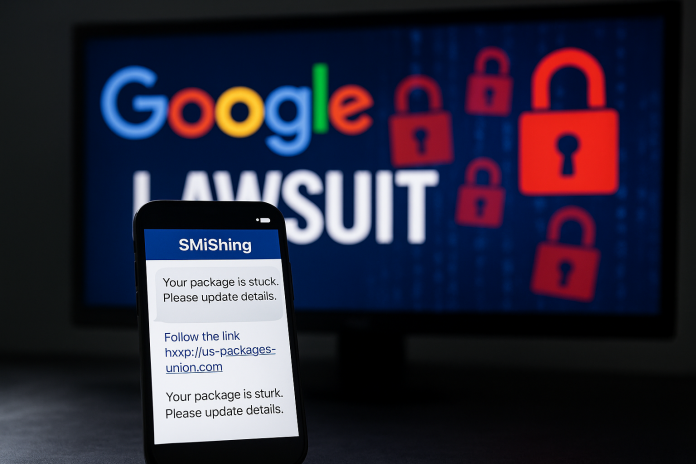
Google has launched an aggressive new legal offensive against a vast international smishing operation, filing a federal lawsuit that targets an alleged network of cybercriminals based largely in China. The company says the group, referred to as “Lighthouse,” has been responsible for an enormous wave of fake text messages that imitate trusted brands and government agencies in an effort to steal personal and financial information.
These messages, often claiming there is a “stuck package,” an overdue toll, or a fraud alert, direct victims to fake websites designed to harvest passwords, Social Security numbers, and credit card details. According to Google’s general counsel Halimah DeLaine Prado, the scheme may have compromised between 12.7 million and 115 million U.S. credit cards and affected more than one million victims worldwide. In total, Lighthouse has reached users in more than 120 countries.
Google says the criminals used its own branding on over 100 fake websites, creating credible looking login pages that trick unsuspecting users into sharing sensitive data. Screenshots included in the filing show that Lighthouse also mimicked the U.S. Postal Service, E ZPass, city and state agencies, and major payment and social media companies. At least 32,000 fraudulent sites imitating the Postal Service were deployed in a sixteen month period alone.
The lawsuit, filed in the Southern District of New York, is built around the RICO Act, the Lanham Act, and the Computer Fraud and Abuse Act. Google is pursuing a court judgment that would allow it to dismantle Lighthouse’s infrastructure and pressure outside platforms to remove servers, domains, and other tools linked to the operation. The defendants are listed only as “Does 1 through 25,” since investigators have not yet identified the individuals behind the Telegram handles used to coordinate the attacks.
According to Google, Lighthouse operates like a full service criminal enterprise. The group offers a phishing as a service kit that includes hundreds of ready made templates and technical support for scammers. Investigators found more than 2,500 members communicating on public Telegram channels, sharing data, maintaining the software, and recruiting others. The organization reportedly includes separate teams for acquiring victim lists, sending messages, and conducting the actual theft.
Experts say the case may help disrupt the broader ecosystem of text based scams. Kevin Gosschalk, CEO of Arkose Labs, told CBS News that targeting a large group can prompt smaller groups to reconsider continuing their operations. Still, he noted the challenge of pursuing overseas criminals, especially in places where extradition is limited.
Beyond the lawsuit, Google has thrown its support behind three bipartisan bills designed to stem fraud and foreign based robocalls. The company has also rolled out new user protection features, including improved spam detection and a Key Verifier tool in Google Messages.
Officials emphasize that public awareness remains a crucial defense. Users are encouraged not to click on links in unexpected texts, to filter unknown senders, and to regularly check spam folders for legitimate messages caught by automated systems.
Google’s move signals a forceful new attempt to challenge modern cybercrime, using both legal strategy and public education to confront a rapidly growing threat.
This image is the property of The New Dispatch LLC and is not licenseable for external use without explicit written permission.










